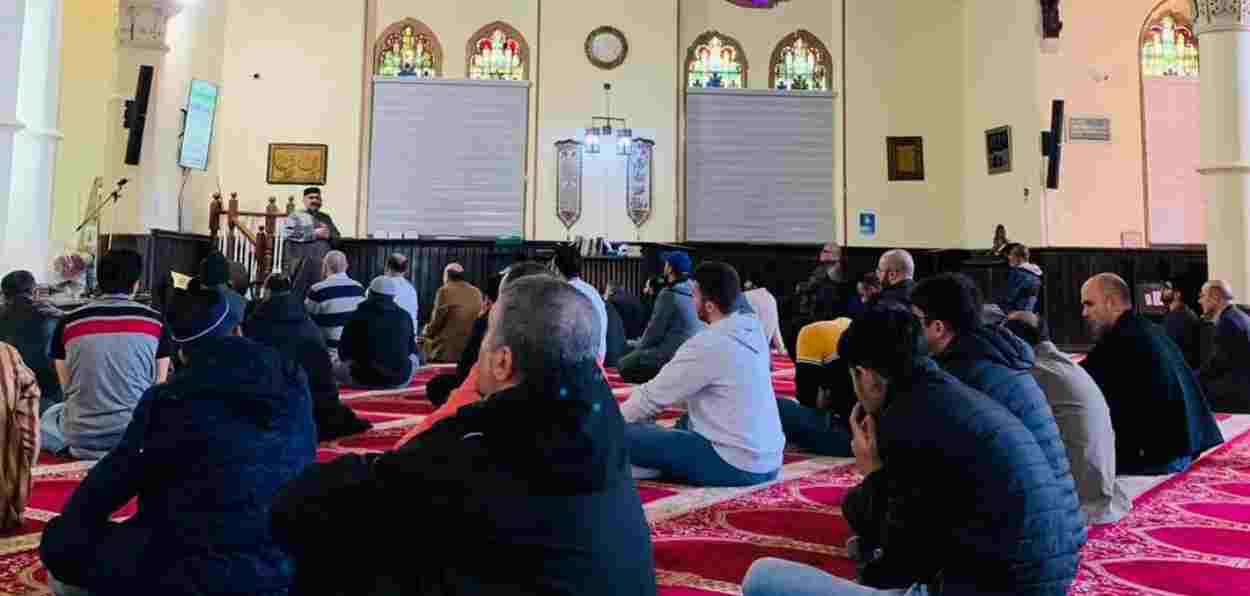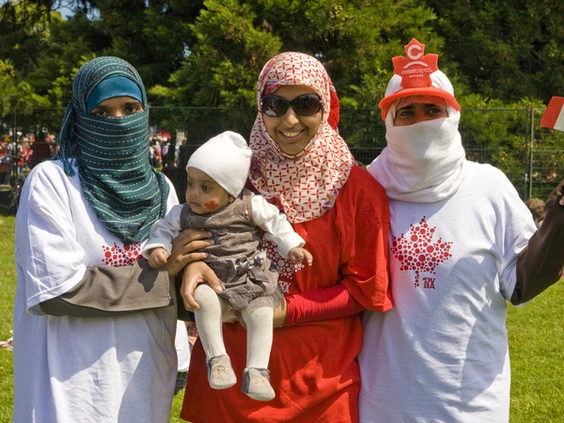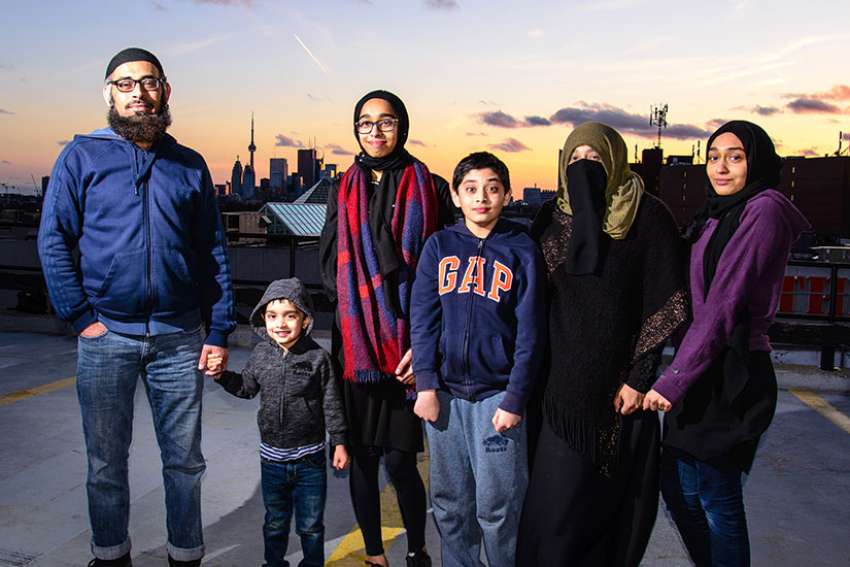
Rita Farhat Mukand
H. Tariq who worships in a little mosque near her home with her family says, “This is the first time we are experiencing Ramadan towards the end of winter and beginning of spring, so it's still cold here and the snow is just starting to melt off the trees and houses, thus we have shorter fasts, while earlier Ramadans were very long in the summer hot humid months of May, June, and July.”
In her beautiful mosque in Ontario, Canada, glowing in the aura of prayers and lights, the experience of Ramadan is warm and surreal. “It's truly a profound experience to perform Taraweeh prayers in our beautiful mosque, standing shoulder to shoulder with people of diverse ethnicities, all united by their faith and worshipping the one and only God. The Imam, who is a young 16-year-old Rohingya refugee, leads us in prayer with his soulful recitation of the Holy Quran. He is a brave survivor of the attack on the Rohingyas.”
In Canada, Muslim women are equally welcome to pray and participate in Mosque activities. An Indian-origin doctor, H Tariq has been living in Canada for a long and is now a stay-at-home mother now. She spoke with Awaz-the Voice about her Ramadan experience in her adopted country.
“It’s better now than 15 years back because now we see people in mosques from all over the world, all ethnicities, Lebanon, Syria, Sudan, Somalia, Libya, India, Pakistan, Bangladesh, Turkey and other countries. There are no borders or boundaries and this makes it a beautiful warm community.” She said reflectively, “When we go to the mosque, we see so much love and unity and make friends for a lifetime.”
The Little Mosque in Ontario, Canada, lit at night
“During Ramadan, we hold potlucks Iftars at the mosque with congregants sharing their cultural foods for everyone to enjoy, and we also hold a community Iftar inviting local officials. With Muslims from all over the globe, we have a marvelous time learning about each other’s cultures and cuisine, something I could have never imagined in India!"
Muslims decorate their houses in the theme of Ramadan. She says Eid prayers are held in a neighbouring bigger city where they rent out a huge indoor hockey stadium or a university sports field. “Thousands of Muslims wearing their traditional clothes congregate to offer the Eid prayer and attend the Eid Fair with their families.
“Growing up in India we used to get excited for our ‘Eidi’, a gift of money from various relatives but nowadays the older kids get money and the younger kids get gifts like games and toys at Eid which adds to their joy.
H Tariq says initially, there were not many Muslims in Ontario but the recent surge in immigration has seen a growth in numbers of the Muslim population. The Muslims in Ontario did not have a mosque and they prayed in the basement of a local church on Fridays. As a mark of gratitude, the Muslims would organize an Iftar during Ramadan and invite the church leaders and city officials to it. A few years ago, a local church building came up for sale and the Muslims bought it and converted it into a mosque. The church is a heritage building, originally built in 1877. “We can now offer prayers five times a day and have Jummah prayers every Friday and Taraweeh prayers during Ramadan,” she said.
She said, "Our mosque also runs a soup kitchen for the underprivileged in the local community and along with the help of social workers has food delivered to older people who are unable to come. Every year they hold an open house where they invite the locals from all communities to visit the mosque. Ramadan is a month of piety and charity and we collect food donations for our local food bank serving the disadvantaged.
 Muslim Women in Canada (Courtesy: Vancouver Sun)
Muslim Women in Canada (Courtesy: Vancouver Sun)She said, “Canada is one place where people understand unity in diversity, and people from different ethnicities are encouraged to preserve and celebrate their religions and cultures. Canada is compared to a salad bowl where variety is the spice of life unlike America which is a melting pot where you tend to blend. Canadians are hardworking and disciplined with a strong sense of integrity. Children raised in this atmosphere are globally aware, very straightforward and vocal about what is right and what is wrong and make educated choices.” Volunteerism is a huge thing in Canada, where people reach out to help kids and the old and it is the fabric of the culture. Unlike other countries, Canadians don’t live in cocoons and reach out in a community spirit.
H. Tariq finds time to volunteer as well. She said they had never planned to leave India but fate willed otherwise. We came to Canada with a bit of trepidation due to the whole new cultural setting. She admits she was worried that her kids would lose their values and traditions. But, her children marvelously imbibed the best of both cultures and turned out to be well-rounded individuals, proud of their Muslim identity and Indian heritage.
 A Muslim family in Canada (Courtesy: Catholic Register)
A Muslim family in Canada (Courtesy: Catholic Register)
“They inculcated the values of hard work, honesty, integrity, and dignity of labour. They too have friends from different ethnicities who love to come over and enjoy my home-cooked Indian food. Youth here work hard from a young age at various jobs retail or food service, just aiming to pay their way up through their college. Nowadays, I see a lot of students from India who come here to attend local colleges also doing the same. It makes me proud to see them work and study hard to make a future for themselves.”
She shared a heartwarming story of her Canadian experience with Awaz-the Voice. After she completed her master's degree, she invited her professor to their home for a meal. She had cooked biryani and other Indian delicacies. The professor loved the food and expressed a desire to learn to cook Indian food.H. Tariq offered to teach her. The professor would take pictures of the food she cooked and take notes of instructions on recipes. At the end of it, she made a cookbook, and presented it to her saying, “I have preserved all your recipes for your children so that they can maintain and share their traditions and culture for all to appreciate.”
H. Tariq says, “While I was her student she would urge me to call her by her first name like all the other students. I
told her that in our culture we never addressed our teachers by their first names out of respect. After she presented the cookbook to me she told me that I could now call her by her name since I had become her teacher. I eventually did and she is now a dear friend.
ALSO READ: In Jammu, Thakur Baldev Singh carries on 100-year tradition of hosting iftar
“During Christmas, while most Christians are celebrating, my husband works shifts in the hospital, and I send butter chicken and nan for the nurses working there. We have the fear of the unknown, but under our skin, we are the same. When we share our culture and traditions, by inviting people to our homes it keeps our community of diverse people connected and happy and thriving.”
Rita Farhat Mukand is an independent writer
